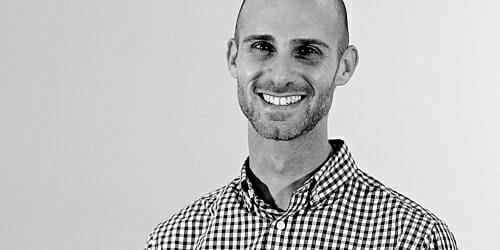New Faculty Focus: Simon Goldberg
Name: Simon Goldberg
Title: Assistant professor, Department of Counseling Psychology; Affiliate Faculty, Center for Healthy Minds
Hometown: Evanston, IL
Educational/professional background: I completed my bachelors’ degree in sociology at Tufts University and my PhD in counseling psychology right here at the University of Wisconsin–Madison. For my clinical internship, I trained at the Seattle VA hospital and completed postdoctoral training in health service research at the University of Washington and the Seattle VA.
How did you get into your field of research? I was drawn to sociology in college as a method for understanding and addressing large-scale challenges facing human societies, but became discouraged by the enormity of tackling these issues at the macro level. I was introduced to meditation after my sophomore year and really just fell in love with it. I was struck by the power of meditation practice, and was fascinated by the possibility that relatively simple (and ancient) techniques could have dramatic intra- and interpersonal effects. After spending several years exploring various Buddhist traditions, I decided to return to graduate school in order to study meditation and psychotherapy using the tools of modern science. My work has since expanded to include a focus on therapist contributions to psychotherapy treatment outcomes and mental health in military veterans.
What attracted you to UW–Madison? UW–Madison’s reputation as a research powerhouse was a major draw for me, both as a graduate student and faculty member. I’ve found faculty and students to be passionate about their work, sincere, and also very open to building collaborations and working across disciplinary boundaries. I can’t imagine a better setting than Madison for housing a world-class university. And, of course, the Terrace can’t be beat.
What was your first visit to campus like? My first visit as a prospective graduate student was very exciting. I met with numerous potential mentors and could feel the openness to new possibilities, even in those initial conversations. My first visit as a prospective faculty member was thrilling – having a chance to be welcomed back as a potential colleague and really just feeling at home here at UW–Madison.
What’s one thing you hope students who take a class with you will come away with? I hope to communicate the remarkable potential we have as human beings for growth and change, be that through formal interventions (e.g., psychotherapy, meditation practice) or through positive relationships with others (e.g., families, communities).
Do you feel your work relates in any way to the Wisconsin Idea? Definitely. My work focuses broadly on finding ways to promote well-being and reduce suffering, which certainly relates to the health and well-being of residents of Wisconsin. I have been involved in numerous studies examining both traditional psychotherapy and Buddhist contemplative practices for promoting mental health, whether for children and teachers, smokers attempting to quit, or military veterans.
What’s something interesting about your area of expertise you can share that will make us sound smarter at parties? While differences between psychotherapies (e.g., cognitive-behavioral therapy vs. psychodynamic psychotherapy) account for 1 percent or less of the variance in treatment outcomes, differences between therapists (i.e., a highly effective therapist vs. an ineffective therapist) accounts for approximately 5 times more. Which is to say, it’s probably more important to pick a good therapist than a good therapy.
Hobbies/other interests: Bicycle commuting, playing the banjo, cooking vegetarian food.

